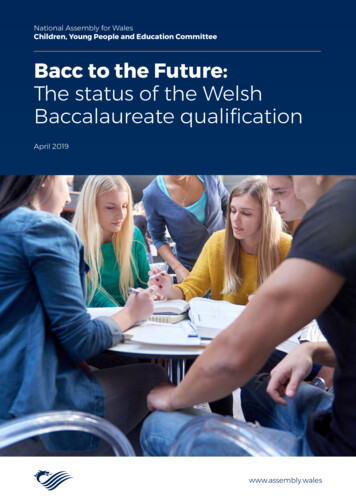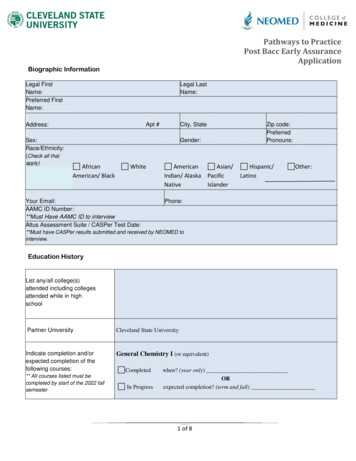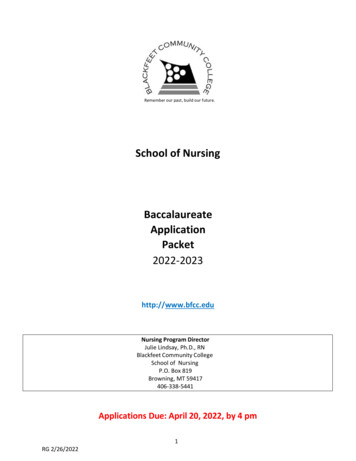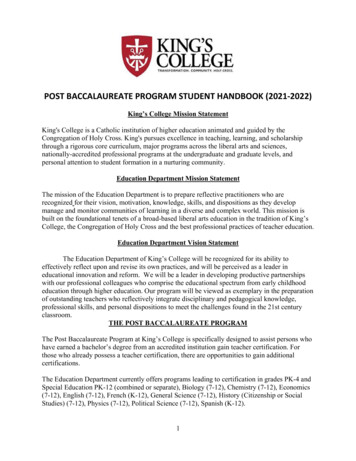
Transcription
National Assembly for WalesChildren, Young People and Education CommitteeBacc to the Future:The status of the WelshBaccalaureate qualificationApril 2019www.assembly.wales
The National Assembly for Wales is thedemocratically elected body that representsthe interests of Wales and its people, makeslaws for Wales, agrees Welsh taxes and holdsthe Welsh Government to account.An electronic copy of this document can be found on the National Assemblywebsite: www.assembly.wales/SeneddCYPECopies of this document can also be obtained in accessible formats includingBraille, large print, audio or hard copy from:Children, Young People and Education CommitteeNational Assembly for WalesCardiff BayCF99 1NATel: 0300 200 6565Email: SeneddCYPE@assembly.walesTwitter: @SeneddCYPE National Assembly for Wales Commission Copyright 2019The text of this document may be reproduced free of charge in any format ormedium providing that it is reproduced accurately and not used in a misleadingor derogatory context. The material must be acknowledged as copyright of theNational Assembly for Wales Commission and the title of the document specified.
National Assembly for WalesChildren, Young People and Education CommitteeBacc to the Future:The status of the WelshBaccalaureate qualificationApril 2019www.assembly.wales
About the CommitteeThe Committee was established on 28 June 2016. Its remit can be found at:www.assembly.wales/SeneddCYPECommittee Chair:Lynne Neagle AMWelsh LabourTorfaenAelodau cyfredol y Pwyllgor:Dawn Bowden AMWelsh LabourMerthyr Tydfil and RhymneyHefin David AMWelsh LabourCaerphillySuzy Davies AMWelsh ConservativesSouth Wales WestJanet Finch-Saunders AMWelsh ConservativesAberconwySiân Gwenllian AMPlaid CymruArfonJack Sargeant AMWelsh LabourAlyn and DeesideThe following Members were also members of the Committee during this inquiry.Michelle Brown AMIndependentNorth WalesJulie Morgan AMWelsh LabourCardiff NorthLlyr Gruffydd AMPlaid CymruNorth Wales
Bacc to the Future: The status of the Welsh Baccalaureate qualificationContentsChair’s foreword . 5Recommendations . 61. Background . 82. The Welsh Bacc: context . 9What is the Welsh Bacc? . 9What is the Skills Challenge Certificate? . 10Assessing the SCC and Welsh Bacc. 11Qualifications Wales reviews. 113. Value and understanding. 14Perceptions of the Welsh Bacc . 144. An equivalent and rigorous qualification . 28The Skills Challenge Certificate .29University acceptance. 345. Universal adoption . 39Welsh Government policy . 39Impact on learners . 436. Impact on curriculum and wider education . 48Impact on the curriculum . 48Impact on teachers .52
Bacc to the Future: The status of the Welsh Baccalaureate qualificationChair’s forewordSince our establishment as a Committee, concerns about the WelshBaccalaureate qualification (the Welsh Bacc) have appeared periodically in thenews and in our constituency and Committee inboxes alike. Anecdotal reports ofuniversities choosing not to accept the qualification, parents and pupils expressingconcern about its impact on learner choice and success in other subject areas,and teachers feeling ill-prepared to deliver the Welsh Bacc rang alarm bells for us.We wanted to hear directly from those on the frontline – pupils, parents, teachers,employers and universities – about their experiences of the Welsh Bacc toestablish how widespread the challenges raised with us were. We found thatnegative perceptions of the Welsh Bacc are attributable to both a lack ofunderstanding of the qualification’s purpose and content, and the inconsistencyin its delivery across Wales. Nevertheless, we also found that understanding of theWelsh Bacc is growing and with it a greater sense of the value it can add tolearners’ skills and experiences.Despite our initial doubts, the evidence we gathered showed clear merit tostudying the Welsh Bacc, particularly in terms of the breadth of skills developed bylearners for future learning, employment and life. However, we concluded that theway in which the qualification is currently delivered and publicised is having adetrimental effect on its actual and perceived value.Learners, parents and education professionals need to be assured that the WelshBacc is valued at a level commensurate to the effort required to complete it.Employers and universities – key stakeholders and intended benefactors of thequalification – remain under informed about the qualification. Centres of learningremain worryingly inconsistent in their approach to its teaching, and duplicationof effort and unmanageable assessment requirements are leaving teachers andlearners understandably fatigued.For the Welsh Bacc’s potential to be fully realised, these issues need to beaddressed as a matter of priority. Clarity is also needed about the WelshGovernment’s policy of universal adoption - the circumstances in which learnersmay be exempt from studying the Welsh Bacc need to be set out clearly for allschools and colleges to follow. If the changes we outline are delivered, we believethat the future of the Welsh Bacc – and its learners – is bright.Lynne Neagle AM,Chair of the Children, Young People and Education Committee5
Bacc to the future: The status of the Welsh Baccalaureate qualificationRecommendationsRecommendation 1. That the Welsh Government issue a clearer statementabout its vision for the Welsh Bacc, underpinned by guidance that details itsexpectations in relation to the consistency of the qualification’s delivery in Walesand the resources schools and colleges should make available to teach thequalification effectively. . Page 27Recommendation 2. That the Welsh Government and Qualifications Wales worktogether to deliver a focused awareness-raising campaign for business and highereducation institutions. This campaign should aim to increase understanding ofthe skills developed under the Welsh Bacc and encourage greater collaborationwith those sectors in its design and delivery, to secure their engagement and buyin .Page 27Recommendation 3. That the Welsh Government undertake work to provide acomprehensive list of those universities that accept the Welsh Bacc in their offers.This list should include details of exactly how each university treats the WelshBacc, and whether: it is accepted as an equivalent A-level; it is used to enable an alternative offer to be made by lowering thegrade requirements in other subjects; it is considered only as part of a candidate’s personal statement. Page 38Recommendation 4. That Qualifications Wales consider urgently whether onehigher education liaison officer is sufficient to establish a picture of the highereducation landscape in relation to the Welsh Bacc, and raise awareness andunderstanding of it across the sector. Resources should be re-allocated asnecessary to provide more focus on – and deliver more progress in – this area,including the appointment of an additional higher education liaison officer(s) ifnecessary. . Page 38Recommendation 5. That the Welsh Government issue as a matter of prioritystrengthened and more detailed guidance on the policy of universal adoption.This guidance should set out clearly the circumstances in which learners may beexempt from studying the SCC, and be subject to a rigorous and comprehensivechildren’s rights impact assessment. .Page 456
Bacc to the Future: The status of the Welsh Baccalaureate qualificationRecommendation 6. That the Welsh Government engage with schools andFurther Education institutions to establish whether: learners in border areas are choosing to study in England in order toavoid the Welsh Bacc; and colleges and sixth forms are using flexibility in relation to the WelshBacc to market attractiveness to learners.and report back to the Committee within six months on its findings. . Page 45Recommendation 7. That the Welsh Government ensures the mental health andwellbeing of learners is at the forefront of all considerations and activity itundertakes in relation to the future of the Welsh Bacc. The Welsh Governmentshould also engage with Qualification Wales to ensure that the work of its DesignGroup has the mental health and wellbeing of learners at its centre. . Page 47Recommendation 8. That the Welsh Government undertake work to monitor onan ongoing basis the impact of the Welsh Bacc and other education reforms onthe wider curriculum. . Page 55Recommendation 9. That the Welsh Government improve the delivery of theWelsh Bacc by: ensuring that both initial teacher education and continuous professionaldevelopment are fit for purpose for its delivery; ensuring a system for the sharing of best practice is established acrossschools and colleges in Wales; issuing guidance outlining the expectation that all schools follow bestpractice by having a designated, specialist Welsh Bacc Coordinator; exploring whether better Welsh Bacc materials/resources are needed,and delivering them if so. .Page 55Recommendation 10. That the Welsh Government ensure that lessons learnedsince the new Welsh Bacc’s introduction in 2015 are reviewed systematically andused alongside the conclusions of the Wavehill Report and the forthcomingresults of the Qualifications Wales Design Group’s work to inform the design,implementation, resourcing and communication of the new curriculum in Wales. Page 557
Bacc to the future: The status of the Welsh Baccalaureate qualification1. Background1.In May 2018 we agreed to undertake an inquiry into the status of the revisedWelsh Baccalaureate (the Welsh Bacc) qualification, introduced for teaching fromSeptember 2015.2.We agreed to look at the qualification at Key Stage 4 (14-16 years old) andpost-16, focusing on: the extent to which the Welsh Bacc is understood and valued bylearners, parents, education professionals in schools and colleges, highereducation institutions and employers; the extent to which the Welsh Bacc is considered by learners, educationprofessionals in schools and colleges, employers and higher educationto be an equivalent, rigorous qualification; the status of the Welsh Bacc in schools and colleges, including theWelsh Government’s target for universal adoption and the potentialimpact of this approach; the wider impact of studying the Welsh Bacc on other curriculumsubjects and education provision; the benefits and disadvantages of the Welsh Bacc to learners, schoolsand colleges, higher education institutions and employers.3.We collected written evidence and oral evidence between May andDecember 2018, full lists of which are provided in Annex A and B to this report.We also conducted surveys with parents and learners, and higher educationinstitutions across the UK and sought employers’ views through an onlinedialogue platform.1 We hosted a roundtable event with education professionalsand visited Bangor, Llanelli and Crickhowell to hear directly from young peoplecurrently studying, or who had previously studied, the Welsh Bacc.2.4.We would like to thank everyone who contributed to our inquiry.Full analyses of the parents and learners survey results, and higher education institution surveyresults, have been published. Results from the Dialogue platform are also available, however thelevel of engagement was low – this is discussed in more detail in a later chapter of this report.12Notes of the roundtable events and visits across Wales have been published.8
Bacc to the Future: The status of the Welsh Baccalaureate qualification2. The Welsh Bacc: contextThe Welsh Bacc qualification is a framework that aims toenable learners to develop skills for further learning,employment and future life. The qualification in its currentform was introduced in September 2015, building on thepredecessor Welsh Bacc which was introduced just over adecade earlier.What is the Welsh Bacc?5.The Welsh Bacc is comprised of a number of component qualifications: the skills-based Skills Challenge Certificate qualification; GCSEs in English or Welsh Language, and Mathematics or MathematicsNumeracy. The literacy and numeracy components of the Essential SkillsWales qualification can also be used; and a choice of supporting qualifications – GCSEs, A levels or vocational.Source: Qualifications Wales9
Bacc to the future: The status of the Welsh Baccalaureate qualification6.The Welsh Bacc is awarded at three levels: Foundation (level 1) at key stage 4or post-16; National (level 2) at key stage 4 or post-16; and Advanced (level 3) atpost-16.7.A student is awarded the Welsh Bacc by achieving the specified combinationof qualifications for each level. The Welsh Bacc at each level is graded as a pass orfail.Re-design of the Welsh Bacc8.New versions of the Welsh Bacc at Foundation, National and Advanced levelswere introduced for first teaching in September 2015 following recommendationsmade in the Review of Qualifications for 14 to 19-year-olds in Wales.3 The designof the Welsh Bacc is now considerably different from its predecessor and hasrequired significant change in practice within schools and colleges.4What is the Skills Challenge Certificate?9.The Skills Challenge Certificate forms one part of the Foundation, Nationaland Advanced level Welsh Bacc. It is a skills-based qualification, comprising fourcomponents:Source: Qualifications Wales3Welsh Government, Review of Qualifications for 14 to 19-year-olds in Wales, November 20124Written evidence, WB FI 01 - Qualifications Wales10
Bacc to the Future: The status of the Welsh Baccalaureate qualification10. Each of the four components aims to develop skills in the fields of literacy,numeracy, digital literacy, critical thinking and problem solving, planning andorganisation, creativity and innovation, and personal effectiveness.11. Qualifications Wales states that, at Foundation and National levels, the SkillsChallenge Certificate is the same size as a GCSE, and at Advanced level the SkillsChallenge Certificate is the same size as an A level. The Advanced Skills ChallengeCertificate carries UCAS tariff points.5Assessing the SCC and Welsh Bacc12. All components of the SCC are assessed by teachers in schools and colleges.After internal standardisation, a sample of work is moderated by the awardingbody, the WJEC, to ensure fairness and consistency across centres.13. Each component of the SCC is marked individually and a candidate mustpass all four components to be awarded a grade for the SCC. If a learner does notachieve all the required supporting qualifications to be awarded a pass for theWelsh Bacc, but has achieved the SCC, the SCC can still be awarded.SCCOverall Welsh BaccFoundation level 1Pass or Pass*Pass or FailNational level 2A-CPass or FailAdvanced level 3A*- EPass or FailQualifications Wales reviews2016 report14. As the independent regulator of qualifications in Wales, Qualifications Walesmonitored and reviewed the introduction of the re-designed Welsh Bacc in 2015.An initial report about the implementation of the new Welsh Bacc was publishedin March 2016.615. The 2015-16 review considered resources, training and supporting materialsfor the new Welsh Bacc, administration and e-portfolio arrangements, assessmentof the SCC, the structure of the Welsh Bacc, and wider policy considerations.5Qualifications Wales, Skills Challenge Certificate, accessed 27 February 2019Qualifications Wales, Review of the implementation of the new Welsh Baccalaureate fromSeptember 2015, March 2016611
Bacc to the future: The status of the Welsh Baccalaureate qualification16. Qualifications Wales reported widespread support for the Welsh Bacc and itsaims of developing learners’ skills and experiences for further study andemployment. It also stated that stakeholders agreed with reforming andstrengthening the Welsh Bacc. However, a number of concerns about the redesigned Welsh Bacc were highlighted as part of the review, including: the practical impact of universal adoption; the impact of requiring all qualifications taken as part of the Welsh Baccto be taken at the same level (1, 2 or 3) as each other; the feasibility and manageability of expectations set by the fundingpolicy; the lack of awareness and understanding of the Welsh Bacc amongstaff, learners, parents, employers and higher education.17. Among the 2016 report’s recommendations was one suggesting a furtherreview be undertaken to consider the structure and assessment of the SCC.2018 report18. In response to the recommendations of the 2016 report, Qualifications Walescommissioned Wavehill Ltd and the Institute of Education at University CollegeLondon to conduct a review of the design of the SCC and its place within theWelsh Bacc. This comprised a desk-based review of the main documentssupporting delivery of the Welsh Bacc, focus groups with a sample of schools andFE centres, and interviews with teachers, lecturers and Welsh Bacc coordinators.Views from employers and higher education institutions were not sought.19. In April 2018, the Review of the design and assessment model of the SkillsChallenge Certificate, and its place within the Welsh Baccalaureate Report (“theWavehill Report”) was published.7 The review found that the overall purpose of theWelsh Bacc had laudable principles, with the Challenges and Individual Projectproviding opportunities for learners to develop “highly relevant skills”. However, italso concluded that: delivery of the SCC alongside the curriculum is complex to manage andrequires extensive curriculum coordination;Wavehill Ltd and UCL Institute of Education, Review of the design and assessment model of theSkills Challenge Certificate, and its place within the Welsh Baccalaureate, April 2018712
Bacc to the Future: The status of the Welsh Baccalaureate qualification the design of the SCC is complex and there is repetition in content,learning outcomes, methods of assessment and assessment criteriaacross each level; there is repetition across the four components of the SCC; teachers felt they had a good understanding of the design of the WelshBacc and the SCC but found it challenging to explain to learners andparents, other teachers and in some cases, senior managers; learners did not fully understand the SCC and there was confusionabout the way it is assessed.20. The Wavehill Report made eight recommendations all of which wereaccepted by Qualifications Wales. These related to reviewing the informationavailable about the SCC and the Welsh Bacc, increasing awareness of thequalifications, and improving continuous professional development. It alsorecommended that Qualifications Wales review the design of the SCC includingits structure and content.The Design Group21. Qualifications Wales has established a working group (referred to as “thedesign group”) to help develop and consider proposals for change based on theWavehill Report’s recommendations. The group includes representatives from theWelsh Government, the WJEC, Estyn, the regional consortia, ColegauCymru andindependent assessment experts.22. A wider group of stakeholders, including students, teachers, employers anduniversities will be used to “refine and validate” the design group’s proposals. Apractitioners’ group, comprising approximately 25 teachers who deliver the SCCfrom a broad range of schools and colleges across Wales, has also beenestablished to test proposals and provide feedback to inform developments.88Qualifications Wales, Skills Challenge Certificate, accessed 27 February 201913
Bacc to the future: The status of the Welsh Baccalaureate qualification3. Value and understandingEvidence to our inquiry suggests that understanding of theWelsh Bacc is relatively low among key groups, not leastparents, employers and universities. The value attributed tothe qualification tends to correlate with an individual’sunderstanding of it – the higher the understanding, the moreit tends to be valued. Significant work is needed to raiseawareness and understanding of the Welsh Bacc if it is to bevalued by those on whom it aims to have a positive impact.23. The stated aim of the Welsh Bacc is to enable learners to develop skills forfurther learning, employment and future life. Evidence to our inquiry suggestedthat understanding of the Welsh Bacc varies significantly, as does the valueattributed to it as a qualification.Perceptions of the Welsh Bacc24. Perceptions of the Welsh Bacc were very mixed in the evidence we gathered.25. A number of areas in which the qualification – particularly the SCC – wasvalued were identified. These included opportunities the qualification offered to:910 build young people’s skills and confidence;9 allow choice and control for learners;10 enable young people to undertake critical thinking;11 encourage independent learning;12 develop skills in young people that employers are asking for;13Written evidence, WB06 – Undeb Cenedlaethol Athrawon CymruWritten evidence, WB06 – Undeb Cenedlaethol Athrawon Cymru11Written evidence, WB22 – National Education Union Cymru12Written evidence, WB18 – Regional Consortia for Wales13CYPE Committee, RoP [para 328], 22 November 201814
Bacc to the Future: The status of the Welsh Baccalaureate qualification enable young people to reach university (either by being consideredwithin the admissions process as interchangeable with A-levels, byenabling an alternative offer, or through strengthening a learner’spersonal statement).1426. Nevertheless, a number of examples of poor perceptions of the Welsh Baccwere also highlighted, including: being viewed as “inhibitive” by learners, education professionals andparents in terms of its impact on a young person’s choice of subjects,success in other qualifications, and general wellbeing; poor staff resourcing and training leading to negative experiences of theWelsh Bacc, including it being perceived in some cases as an “add on”for teachers with surplus in their timetables rather than expertise in thequalification;15 a belief that universities do not value and/or accept the qualification;16and a feeling among learners that it is repetitive in nature between KeyStage 4 and Advanced levels.1727. There was mixed evidence about the extent to which the Welsh Baccexposes learners to experiences and training in skills that would otherwise not beavailable through standard qualifications. The Association of School and CollegeLeaders Cymru felt that the Welsh Bacc did this,18 however others – includingyoung people and parents who responded to our survey19 – expressed the viewthat these skills could be developed via other curriculum subjects.28. The influence on learners’ and parents’ perceptions of studying the WelshBacc at Key Stage 4 was raised. Young people who spoke with us during our visitsaround Wales explained that a bad experience early on did not encourage14CYPE Committee, Note of visits across Wales to speak with young people, published March 201915Written evidence, WB22 – National Education Union Cymru and WB11 – NASUWT16Written evidence, WB22 – National Education Union CymruSee written evidence WB02 – Individual, WB06 – Undeb Cenedlaethol Athrawon Cymru, WB10 –Children’s Commissioner for Wales, WB12 – Pembrokeshire College and WB13 – ColegauCymru andCYPE Committee, RoP [para 245], 14 November 2018 and RoP [paras 46 and 55], 28 November20181718Written evidence, WB14 – Association of School and College Leaders Cymru19CYPE Committee, Summary of survey results, published October 201815
Bacc to the future: The status of the Welsh Baccalaureate qualificationenthusiastic uptake at post-16 level. This was reinforced by Dafydd Evans, Chair ofColegauCymru, who told us:“ don’t underestimate the fact that if you had a poor experience of theWelsh Bacc at school, that perception is very difficult [.] to change.”2029. Some suggested that the three levels of the Welsh Bacc were vieweddifferently, with the value of the foundation and national levels described as“questionable” by further education representatives.2130. The tendency for learners to see retrospectively the value and benefits ofstudying the Welsh Bacc was highlighted.22 The Association of School and CollegeLeaders Cymru summarised:“Discussions with former students who return to visit school after theyhave left to go to university or into work reveal that, in retrospect, theyunderstand and value greatly the benefits of having done thequalification, but acknowledge that, at the time, they did not. This is notan unusual response with regard to many aspects of education andshows how perspectives can change with time and experience.Interestingly, we have come across a few cases of students who did notdo the WBQ and subsequently have stated that they felt they missedout on some important and potentially valuable learning experiences.”23Understanding of the Welsh Bacc31. The majority of those who gave evidence identified the level ofunderstanding of the Welsh Bacc as a key influencing factor in the valueattributed to the qualification. This was summarised by our discussions witheducation professionals, who reported:“The more it is understood, the more it is valued [.] acceptance isgrowing and its value is increasing.”242021CYPE Committee, RoP [para 127], 28 November 2018CYPE Committee, RoP [paras 48-53], 28 November 2018CYPE Committee, RoP [paras 24, 197 and 303], 14 November 2018 and Notes of roundtablestakeholder group and Notes from school visits, published March 20192223Written evidence, WB14 – Association of School and College Leaders Cymru24CYPE Committee, Notes of roundtable stakeholder group, published March 201916
AS PART OF OUR SURVEY ON THE WELSH BACC WE ASKED LEARNERS ANDPARENTS .how useful the Welsh Bacc is in preparing for work and lifeOver 50% of respondents felt that the Welsh Bacc was less useful than otherqualifications in preparing for work and life.66% of respondents did not feel the Welsh Bacc would be valuable to futurecareers. .about the amount of time it takesto study the Welsh BaccAlmost 70% of respondents feltthat the Welsh Bacc was more timeconsuming than other ‘equivalent’qualifications. .what impact studying theWelsh Bacc had on studying otherqualificationsHalf of respondents felt it had anegative impact with 57% of saying itwas too time consuming .what other comments they had about the Welsh BaccMany respondents mentioned the effect of the Welsh Bacc on getting intouniversityWBQ has had a HUGE and very positive impact on my future and theuniversities I have been able to apply for. This is because it counts asa full A level which is hugely beneficial for someone like myself who ismuch better at coursework based subjects. Having WBQ means I have4 A levels and I am able to say I got an A* in A level which is extremelyappealing to universities /employers.I believe that Welsh Bacc takes time away from lessons that I’d ratherbe doing/need for my future. If I decide to go to uni in another countrysuch as England or Scotland, I feel like it would be useless, and thatthey don’t look for any qualification from Welsh Bacc.Some of you thought the Welsh Bacc is a good qualification but wanted a choiceabout whether to study it or notThe Welsh Bacc, especially at A Level standard, should NOT becompulsory . If learners choose to study it then they should be allowedto, but those who don’t want / need to study it should not be forced todo so.Survey promotion and analysisThe survey was publicised throu
Welsh Baccalaureate (the Welsh Bacc) qualification, introduced for teaching from September 2015. 2. We agreed to look at the qualification at Key Stage 4 (14-16 years old) and post-16, focusing on: the extent to which the Welsh Bacc is understood and valued by learners, parents, education professionals in schools and colleges, higher










